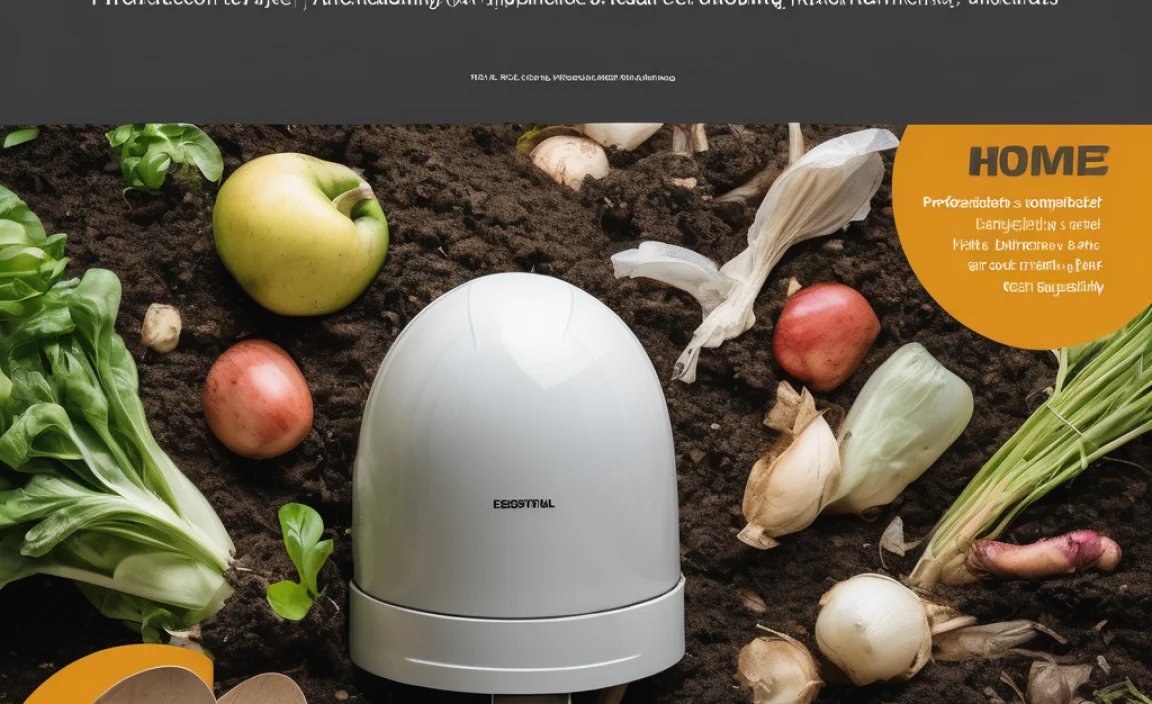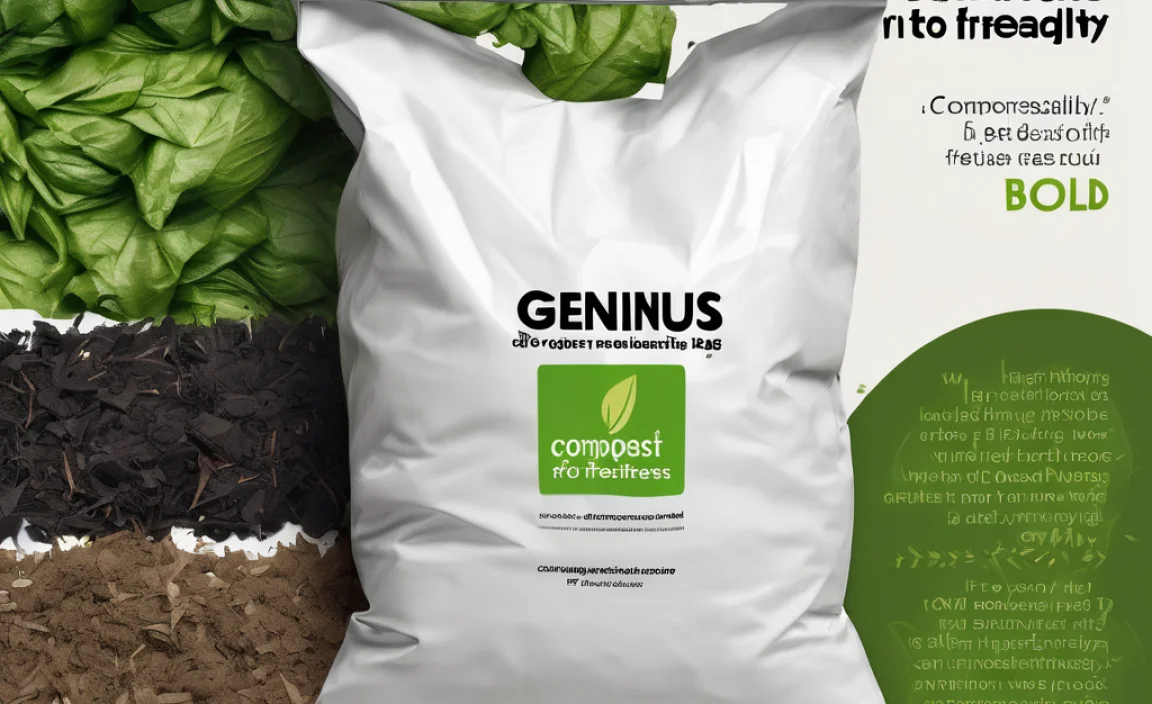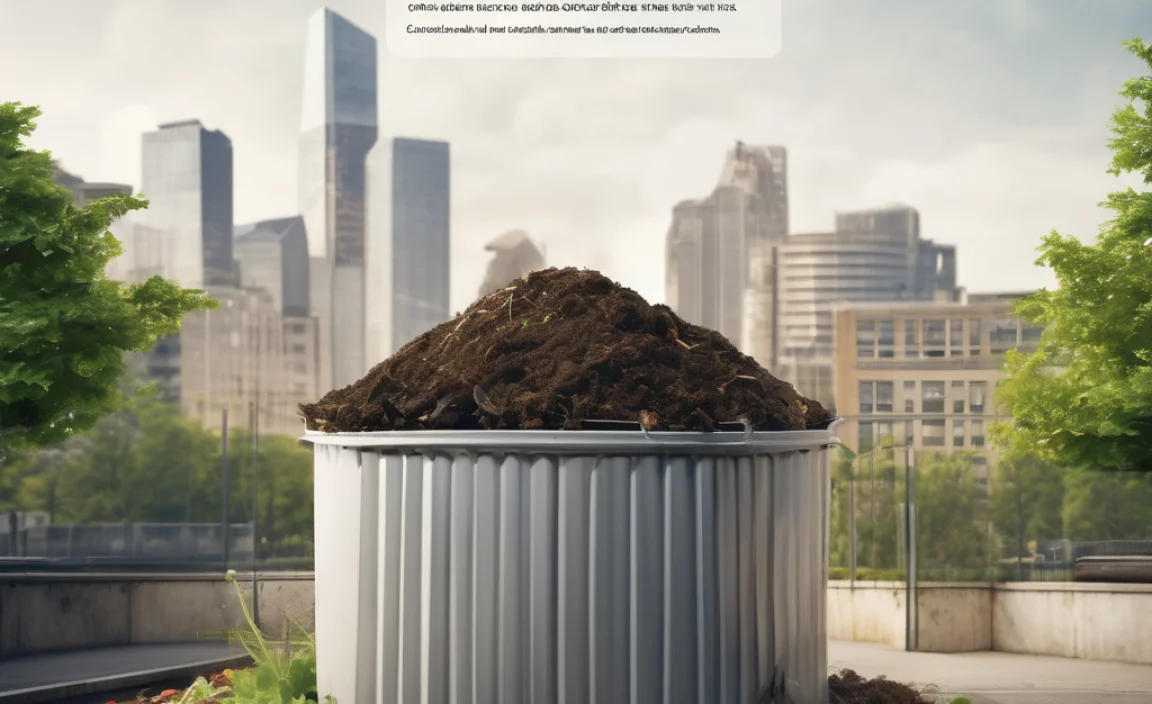Ever toss kitchen scraps into your compost bin and wonder why things are moving so slowly? You’re not alone! It can be frustrating when your compost pile seems more stagnant than sensational. But what if I told you there’s a tiny, almost secret ingredient that can dramatically speed things up? Today, we’re diving into the world of “compost starter flies” – not as creepy crawlies to avoid, but as your garden’s best friends. Stick around, and I’ll show you how to harness their power for faster, richer compost, the easy way.
Compost Starter Swarms: Your Garden’s Secret Weapon for Speedy Soil
Hey there, green thumbs and aspiring composters! Troy D Harn here, from TopChooser, ready to demystify another aspect of making your home and garden awesome. We all want that rich, black gold to feed our plants, right? But sometimes, the process feels like watching paint dry. You’ve heard of compost activators, but have you ever considered some of nature’s own helpers? Today, we’re talking about what many folks call “compost starter flies.” Now, before you go picturing a biblical plague, let’s get one thing straight: these aren’t the annoying pests you find at a picnic. These particular little critters are actually the MVPs of decomposition, and understanding them is like finding the cheat code for your compost bin.
Think of them as tiny, dedicated workers. They show up, do their job of breaking down organic matter, and help your compost pile heat up and mature much faster. This means you get nutrient-rich compost for your garden sooner, without all the waiting and wondering. We’ll cover exactly what these “flies” are, why they’re so important, how to encourage them, and how to manage them effectively. Get ready to transform your compost game!
Understanding the “Compost Starter Flies” Phenomenon
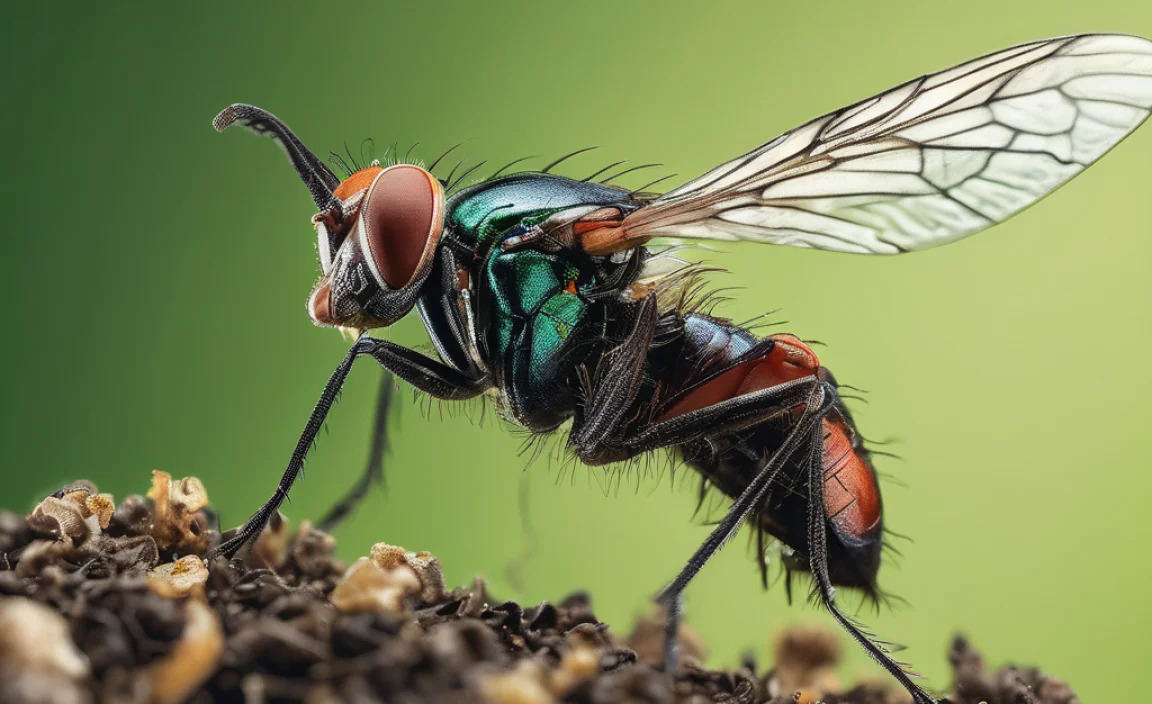
Let’s clear the air about these “compost starter flies.” The term itself isn’t a scientific classification but rather a descriptive nickname used by gardeners. What people are typically referring to are small, beneficial insects that are attracted to decomposing organic matter. The most common culprits are fruit flies (Drosophilidae) that aren’t feeding on your groceries, but rather on the fermenting materials in your compost, and more importantly, soldier fly larvae.
The Real Stars: Soldier Fly Larvae
When gardeners talk about a “compost starter fly” or a “good bug” in their compost, they are often witnessing or actively looking for the larvae of Black Soldier Flies (Hermetia illucens). These aren’t your typical houseflies or fruit flies. Soldier fly larvae are incredibly efficient at consuming a wide variety of organic waste, including food scraps, manure, and yard waste. They are voracious eaters and play a crucial role in breaking down materials that might otherwise take much longer.
Unlike some other composting helpers, soldier fly larvae can handle a diverse diet, including meat and dairy scraps (which you might typically avoid in a standard hot compost pile). They are also quite resilient to temperature fluctuations and can process materials quickly, generating heat in the process. This makes them ideal for accelerated composting and even for waste processing systems.
Why Are They Important for Your Compost?
These little workers, especially the soldier fly larvae, are vital for several reasons:
- Accelerated Decomposition: They eat, and eat, and eat! Their consumption speeds up the breakdown of organic materials significantly.
- Nutrient Cycling: As they eat and excrete, they transform complex organic matter into simpler compounds that beneficial microbes can further process, creating rich humus.
- Waste Reduction: They are incredibly effective at breaking down larger volumes of waste, turning what could be landfill fodder into valuable soil amendment.
- Odor Control: A healthy population of soldier fly larvae can actually help reduce unpleasant odors associated with composting. They process the smelly stuff before it becomes a major issue.
- Pest Deterrence: While they attract soldier flies, they can deter common nuisance pests like house flies and mosquitoes because they outcompete them for food sources and their waste products are less attractive to these pests.
So, while “compost starter flies” might sound a little unsettling, the insects and their larvae typically attracted to a healthy compost system are genuinely beneficial to the composting process.
Attracting and Encouraging Beneficial Compost Inhabitants
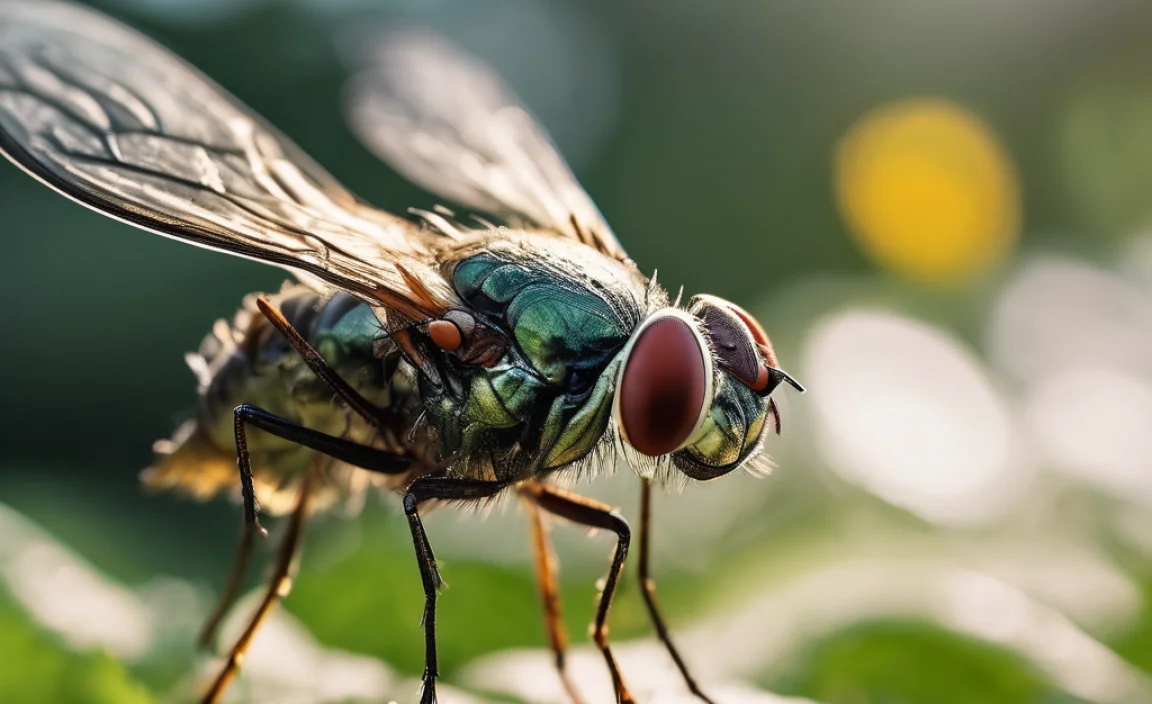
So, how do you get these helpful critters, particularly the Black Soldier Fly larvae, to set up shop in your compost bin? It’s less about an intentional “fly farm” and more about creating the right environment they love. They are naturally occurring and will find suitable places to thrive if given the chance.
Creating an Inviting Habitat
Black Soldier Flies are attracted to warmth, moisture, and, of course, food. Here’s how you can make your compost bin irresistible:
- Choose the Right Location: Place your compost bin in a sunny spot. Black Soldier Flies are heat-loving insects, and a warm bin will encourage their activity, especially during cooler months.
- Maintain Moisture Levels: Your compost should be as damp as a wrung-out sponge. If it’s too dry, the larvae can’t thrive. If it’s too wet, it can become anaerobic (lacking oxygen) and smelly.
- Provide a Diverse Diet (with caveats): While soldier fly larvae can handle a wide range of food scraps, including meat and dairy, it’s always best to bury these richer items deep within the pile. This helps manage any potential odors and discourages less desirable pests. A good balance of “greens” (nitrogen-rich, like food scraps) and “browns” (carbon-rich, like dead leaves and cardboard) is still key for overall composting success.
- Consider a Bioreactor or Specialized Bin: For serious composting with soldier flies, consider a “bioreactor” or a specialized soldier fly compost bin. These are designed to efficiently process waste using soldier fly larvae. They often have a ramp system where the mature larvae crawl up and out to pupate, making collection easy. Many advanced composters swear by these systems for rapid waste breakdown. You can find information on building or buying these through resources like the University Extension system, which often has local agricultural and gardening advice.
What About Actual “Starter” Products?
You might see products marketed as “compost starter” or “compost accelerator.” These often contain beneficial microbes or enzymes designed to kickstart the decomposition process. While not “flies” themselves, they can help create a more active environment that, in turn, might attract beneficial insects like soldier flies. Think of them as a gentle nudge to get things moving.
Here’s a quick look at common compost starter types:
| Starter Type | What it Contains | How it Helps |
|---|---|---|
| Microbial Accelerators | Active bacteria and fungi cultures | Introduces a robust workforce to break down materials faster. |
| Enzyme Boosters | Biological enzymes that break down tough organic matter | Helps speed up the digestion of plant and food waste. |
| Mineral Amendments | Lime, gypsum, or other minerals | Helps balance pH and improve aeration, creating a better environment for microbes. |
| Manure/Finished Compost | Existing mature compost or animal manure | Introduces established microbial communities to inoculate the pile. |
While these commercial starters can be helpful, creating the right conditions for soldier flies and other beneficial organisms is a natural and often more sustainable approach. You can even inoculate a new pile with a shovel-full of finished compost from a healthy pile or some aged manure to introduce beneficial microbes.
Managing the “Compost Starter Flies” in Your System
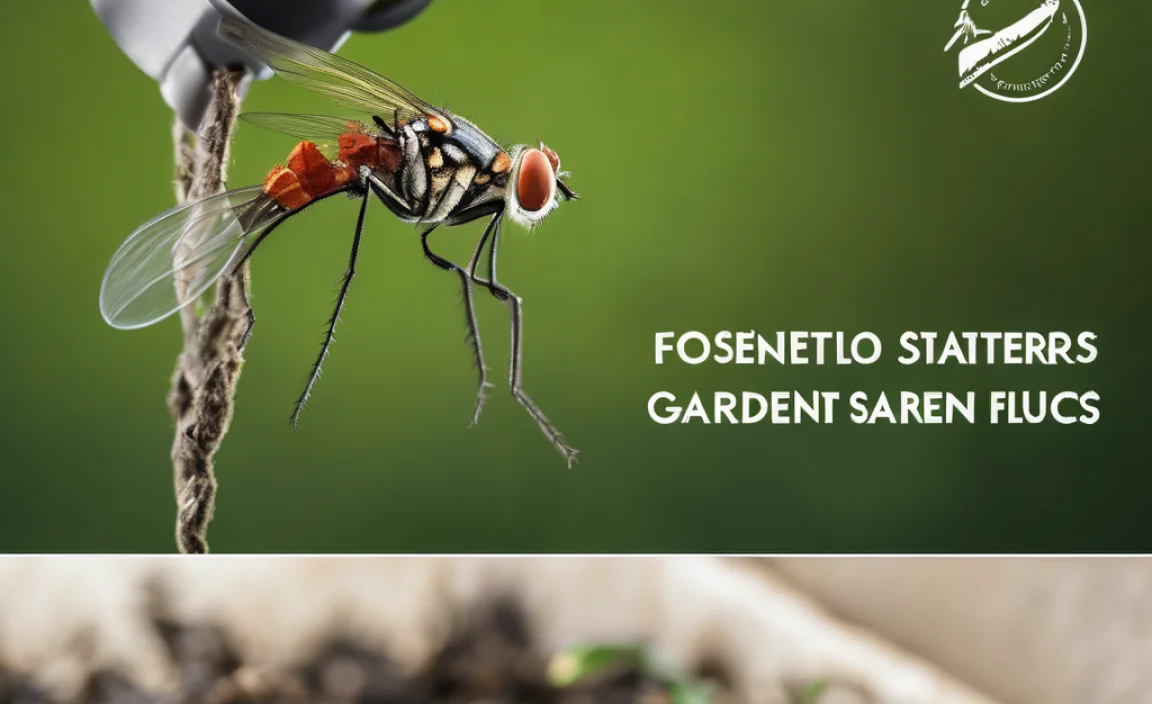
While we want to encourage beneficial soldier flies, nobody wants an overwhelming swarm or flies venturing where they aren’t wanted. The key is management, not eradication. For most home composters, the presence of soldier flies and their larvae is a sign of a healthy, working system.
Natural Population Control
The good news is that soldier flies are generally well-behaved in a composting context. They are not typically invasive or aggressive. Their life cycle involves a brief adult stage focused on reproduction, after which they die. Their larvae do the heavy lifting of decomposition.
Here are some natural ways to manage their presence:
- Maintain Balance: A well-maintained compost pile with a good ratio of greens to browns and proper moisture is less likely to become a breeding ground for nuisance pests.
- Bury Food Scraps: Always bury fresh kitchen scraps under a layer of browns (like dry leaves, shredded paper, or sawdust). This makes them less accessible to flies and helps prevent odors that attract unwanted insects.
- Proper Bin Enclosure: Ensure your compost bin has a lid and that any gaps are minimized. This helps contain the flies and larvae within the bin. Some commercially available composters are designed with secure lids and ventilation to manage this. For DIY bins, you can often add mesh screening to vents.
- Harvest Regularly (if using specialized bins): If you are using a purpose-built soldier fly compost bin (bioreactor), regular harvesting of the mature larvae is part of the system. This naturally controls their population within the bin and provides you with a valuable compost-enhancing material.
When to Be Concerned (and What to Do)
Generally, the “flies” associated with composting are not a cause for alarm. However, if you notice an extreme number of common house flies or a significant infestation of fruit flies that seem to originate from your compost bin, it might indicate an imbalance.
- Too Much Wet Material: An overly wet compost pile that is also rich in fresh food scraps can attract common house flies and make the environment less ideal for soldier flies. Ensure good aeration and add more “browns” like sawdust or dry leaves.
- Exposed Food Scraps: If food scraps are left sitting on top of the pile, they will attract any available flies. Always cover them thoroughly.
- Not Hot Enough: While soldier flies can work in cooler piles, a compost pile that is meant to be a hot-composter but isn’t heating up might not be efficient enough to process materials quickly, leading to other issues. Ensure you have a good green-to-brown ratio and sufficient volume.
For common housefly issues, increasing aeration, burying food waste, and ensuring the bin is adequately covered are the best first steps. If it persists, consider adding a layer of finished compost or a commercial microbial starter to boost the decomposition.
Troubleshooting Common Composting Issues Related to Flies

Even with the best intentions, compost piles can sometimes present challenges. When it comes to flies, here are a few common problems and how to tackle them, keeping our beneficial “compost starter flies” in mind.
Issue 1: Too Many Nuisance Flies (House Flies, Fruit Flies)
Why it happens: This usually means your compost is too wet and/or has exposed food scraps. These conditions are an open invitation for flies looking for an easy meal and breeding ground.
The Fix:
- Add Browns: Go for a “browns” binge! Add more carbon-rich materials like shredded cardboard, dry leaves, straw, or wood shavings. This helps absorb excess moisture and balances the nitrogen-rich “greens” (food scraps).
- Bury Your Scraps: Make a habit of digging a small hole in the compost and tucking your kitchen scraps in, then covering them completely with the compost material.
- Improve Aeration: Turn your compost pile more frequently. This introduces oxygen, which is vital for aerobic decomposition and helps dry out the pile.
- Check Your Lid: Ensure your compost bin has a secure lid to prevent flies from easily accessing the contents.
Issue 2: No Visible Activity (No Soldiers Flies, Slow Decomposition)
Why it happens: The compost might be too cold, too dry, lack essential microorganisms, or have an unbalanced “green” to “brown” ratio. Soldier flies might not be present because the environment isn’t ideal for them, or they simply haven’t found it yet.
The Fix:
- Add Moisture: If the pile is dry, water it thoroughly until it’s consistently damp like a wrung-out sponge.
- Add Greens: If you have too many browns, your pile won’t heat up. Add nitrogen-rich materials like fresh grass clippings, vegetable scraps, or coffee grounds.
- Inoculate: Introduce beneficial microbes! Add a shovel-full of finished compost from a healthy pile or some aged manure. You can also use a commercial microbial compost starter.
- Insulate (for cooler weather): If it’s cold, cover your compost pile with a tarp or a thick layer of straw to help retain heat.
- Consider Soldier Fly Specifics: If you’re aiming for soldier flies, ensure the bin is in a sunny spot and has enough varied food scraps (buried, though) to attract them.
Issue 3: A Few Unpleasant Odors
Why it happens: Often caused by a compost pile being too wet and not getting enough air (anaerobic conditions). While soldier flies can help, extreme odors can indicate a problem beyond their capacity to manage quickly.
The Fix:
- Turn It: Aerate your pile by turning it thoroughly.
- Add Browns: Sprinkle in dry, bulky materials like shredded cardboard or dry leaves to soak up excess moisture and improve airflow.
- Bury Smelly Items: Ensure any particularly pungent food scraps are buried deep within the pile and covered well.
- Avoid Meat/Dairy (if prone to odor): If you struggle with odors, consider temporarily excluding meat and dairy scraps from your pile until you have a more established and efficient composting system.
Remember, composting is a dynamic process. A little observation and adjustment go a long way. You can learn more about the science behind composting from resources like the Environmental Protection Agency (EPA), which offers basic composting guidelines.
The Long-Term Benefits of a Soldier Fly-Friendly Compost System
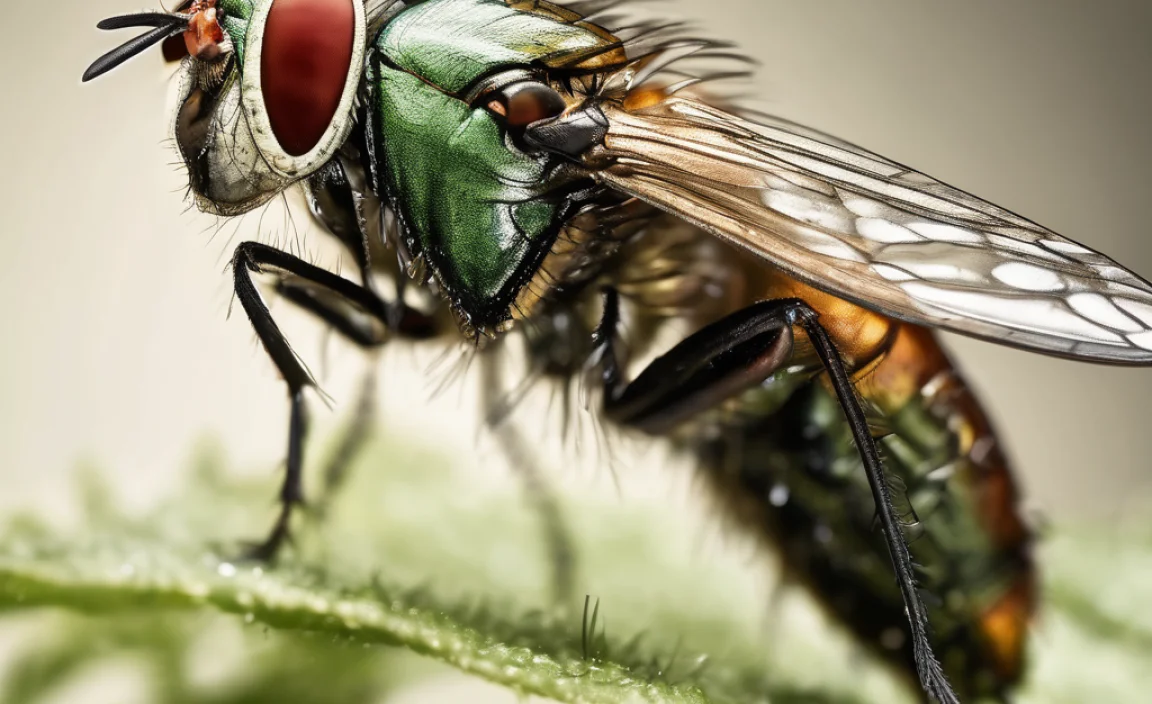
Embracing the “compost starter flies,” or more accurately, the soldiers flies and their larvae, can lead to some fantastic long-term benefits for your garden and your wallet. It’s not just about a faster compost pile; it’s about creating a more robust and sustainable gardening ecosystem.
Enriching Your Soil Naturally
The compost produced with the help of soldier fly larvae is incredibly rich in nutrients and beneficial microorganisms. When you add this compost to your garden beds, you’re not just adding organic matter; you’re introducing a complex web of life that improves soil structure, water retention, and nutrient availability for your plants. This leads to healthier, more vigorous growth and ultimately, a more bountiful harvest or more beautiful blooms.
Reducing Waste and Environmental Impact
Soldier flies are exceptionally efficient at breaking down organic waste. By composting food scraps and yard waste that would otherwise end up in a landfill, you’re significantly reducing your household’s environmental footprint. Landfills produce methane, a potent greenhouse gas. Diverting waste through composting helps mitigate this. It’s a simple, actionable step anyone can take to contribute to a healthier planet.
Cost Savings
High-quality compost is essentially free fertilizer and soil conditioner. Instead of buying expensive soil amendments, mulches, or fertilizers, you can create your own using kitchen scraps and yard waste. Over time, this can lead to significant savings for your gardening budget.
A More Resilient Garden
Healthy soil built with rich compost is the foundation of a resilient garden. It holds moisture better, reducing the need for frequent watering, and provides a steady supply of nutrients, making plants less susceptible to pests and diseases. A garden that thrives on its own compost is a joy to manage and behold.
Conclusion: Embrace the Buzz for Better Compost
So there you have it! Those “compost starter flies” aren’t a problem to be solved, but rather a sign that your compost is ready for some serious action. By understanding and encouraging beneficial insects like the Black Soldier Fly, you can transform your compost pile from a slow-moving chore into a dynamic, efficient decomposition machine. Remember, it’s all about creating the right environment: a little warmth, the right moisture, and a steady supply of buried food scraps. You’ll be amazed at how quickly you can turn your waste into the rich, dark gold your garden craves.
Don’t be afraid to experiment and observe. Composting is a journey, and these little helpers are your allies. Happy composting!
Frequently Asked Questions About Compost Starter Flies
What exactly are “compost starter flies”?
The term “compost starter flies” is a gardener’s nickname for beneficial insects that are attracted to compost piles. Most commonly, it refers to Black Soldier Flies and their larvae, which are highly effective at breaking down organic waste, or sometimes fruit flies and other small flies that help decomposition.</p
.lwrp.link-whisper-related-posts{
margin-top: 40px;
margin-bottom: 30px;
}
.lwrp .lwrp-title{
}.lwrp .lwrp-description{
}
.lwrp .lwrp-list-container{
}
.lwrp .lwrp-list-multi-container{
display: flex;
}
.lwrp .lwrp-list-double{
width: 48%;
}
.lwrp .lwrp-list-triple{
width: 32%;
}
.lwrp .lwrp-list-row-container{
display: flex;
justify-content: space-between;
}
.lwrp .lwrp-list-row-container .lwrp-list-item{
width: calc(25% – 20px);
}
.lwrp .lwrp-list-item:not(.lwrp-no-posts-message-item){
max-width: 150px;
}
.lwrp .lwrp-list-item img{
max-width: 100%;
height: auto;
object-fit: cover;
aspect-ratio: 1 / 1;
}
.lwrp .lwrp-list-item.lwrp-empty-list-item{
background: initial !important;
}
.lwrp .lwrp-list-item .lwrp-list-link .lwrp-list-link-title-text,
.lwrp .lwrp-list-item .lwrp-list-no-posts-message{
}@media screen and (max-width: 480px) {
.lwrp.link-whisper-related-posts{
}
.lwrp .lwrp-title{
}.lwrp .lwrp-description{
}
.lwrp .lwrp-list-multi-container{
flex-direction: column;
}
.lwrp .lwrp-list-multi-container ul.lwrp-list{
margin-top: 0px;
margin-bottom: 0px;
padding-top: 0px;
padding-bottom: 0px;
}
.lwrp .lwrp-list-double,
.lwrp .lwrp-list-triple{
width: 100%;
}
.lwrp .lwrp-list-row-container{
justify-content: initial;
flex-direction: column;
}
.lwrp .lwrp-list-row-container .lwrp-list-item{
width: 100%;
}
.lwrp .lwrp-list-item:not(.lwrp-no-posts-message-item){
max-width: initial;
}
.lwrp .lwrp-list-item .lwrp-list-link .lwrp-list-link-title-text,
.lwrp .lwrp-list-item .lwrp-list-no-posts-message{
};
}

I am passionate about home engineering. I specialize in designing, installing, and maintaining heating, ventilation, and air conditioning systems. My goal is to help people stay comfortable in their homes all year long.


